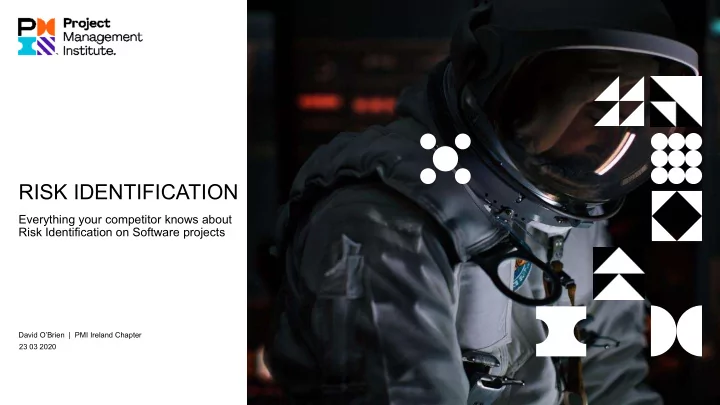

RISK IDENTIFICATION Everything your competitor knows about Risk Identification on Software projects David O’Brien | PMI Ireland Chapter 23 03 2020
Let Risk identification is your super-power Risk Identification 30 MARCH 2020 2
RISK IMPACT PROBABILITY = Risk Identification 30 MARCH 2020 3
Common Risk Areas What types of risks do you believe are common to most projects? Risk Identification 30 MARCH 2020 4
Common Risk Areas Lack of management commitment and support Misunderstanding of the requirements Lack of adequate user involvement Changes to requirements Failure to gain user commitment Failure to manage end user expectation Lack of an effective project management methodology Risk Identification 30 MARCH 2020 5 Process (56%) People (44%)
Interview Risk Identification 30 MARCH 2020 6
Questionnaire Developing the Unrealistic Developing the Personnel wrong Gold plating schedules and wrong user shortfalls functions and budgets interfaces properties Continuing Shortfalls in Shortfalls in Straining Real-time stream of externally externally computer- performance requirements furnished performed science shortfalls changes components tasks capabilities Risk Identification 30 MARCH 2020 7
convergent thinking Brain Storming divergent thinking Risk Identification 30 MARCH 2020 8
Delphi Technique Risk Identification 30 MARCH 2020 9
Constraints and Assumptions Analysis (CAA) Flip Risk Identification 30 MARCH 2020 10
Force Field Analysis (FFA) Risk Identification 30 MARCH 2020 11
Three-Point Estimation most likely optimistic pessimistic Risk Identification 30 MARCH 2020 12
Strengths, Weaknesses, Opportunities and Threats (SWOT) analysis Risk Identification 30 MARCH 2020 13
Fishbone/ Ishikawa Diagram (Cause and Effect) CATWOE Fishbone diagram Actors Clients Transformation Worldview Environment Owner Risk Identification 30 MARCH 2020 14
Failure Mode and Effects Analysis Risk Identification 30 MARCH 2020 15
Observational gaps in Risk Breakdown Structures Risk Identification 30 MARCH 2020 16
Cyclomatic complexity Risk Identification 30 MARCH 2020 17
Residual Risks & Secondary Risks Risk Identification 30 MARCH 2020 18
Summary Techniques Categorisation of Findings Lack of management commitment and support Interview Questionnaire Misunderstanding of the requirements Brain Storming Delphi Technique Lack of adequate user involvement Constraints & Assumptions Analysis Force Field Analysis Changes to requirements Three-Point Estimation SWOT analysis Failure to gain user commitment Cause and Effect Diagram Failure Mode and Effects Analysis Failure to manage end user expectation Risk Breakdown Structures Gaps Cyclomatic complexity Lack of an effective PM methodology Residual Risks & Secondary Risks Risk Identification 30 MARCH 2020 19 Process (56%) People (44%)
Can you see yourself using any of these techniques in upcoming projects? Risk Identification 30 MARCH 2020 20
Do you use any other techniques, not covered in this webinar? If so, what ones? Risk Identification 30 MARCH 2020 21
THANK YOU DAVID O’BRIEN SENIOR PROJECT MANAGER https://www.linkedin.com/in/davidobrien/ david4david4david4@gmail.com (yes, it’s a real email)
Recommend
More recommend